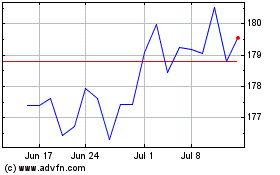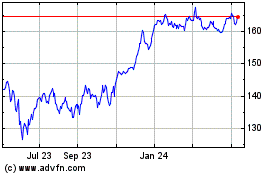AT&T, T-Mobile Are Top Spenders in Airwaves Auction
June 03 2019 - 8:44PM
Dow Jones News
By Drew FitzGerald
AT&T Inc., Verizon Communications Inc. and T-Mobile US Inc.
were the biggest spenders on a pair of Federal Communications
Commission auctions designed to spark investment in next-wave 5G
networks, according to results released Monday.
The auctions covered two swaths of wireless spectrum at
frequencies once considered too extreme for cellphone service. FCC
Chairman Ajit Pai has made those frequencies a cornerstone of his
strategy to spur 5G investments.
Bidding across both auctions totaled less than $3 billion,
compared with nearly $20 billion raised in a previous FCC auction
that freed up frequencies used by local television broadcasters for
cellphone use.
Verizon led spending on the first auction around 28 gigahertz
after it bid $505 million. The leading cellphone carrier by
subscribers was expected to focus on that auction to fill in gaps
in the more than $3 billion worth of licenses it had already bought
through private purchases.
AT&T spent the most on 24 GHz licenses, bidding $983
million. It was followed by T-Mobile, which bid $803 million in the
auction. Midwestern carrier US Cellular Inc. also earmarked cash
for licenses in its service area and won $129 million and $127
million worth of spectrum in the 28 GHz and 24 GHz auctions,
respectively.
Analysts expect the telecom companies to follow up their
spectrum purchases with heavy investments in wireless
infrastructure. The airwaves are considered useful for new 5G
networks that promise to make cellphone connections zippier and
home broadband more affordable, assuming phone companies are able
to offer new internet service at prices that are competitive with
cable.
The earliest U.S. 5G networks are still unproven, however, and
some companies' construction has met opposition from residents
annoyed by more visible antenna systems.
Some weather forecasters are also opposed to commercial activity
at an extreme edge of the 24 GHz range, which they say is too close
to the frequencies their satellites use to predict severe
weather.
The auction's conclusion could also shake up the telecom sector
by allowing more companies to hold merger talks, according to New
Street Research analyst Jonathan Chaplin. FCC rules designed to
prevent coordinated bidding in the auctions had the side effect of
discouraging acquisition discussions. Mr. Chaplin said in a
research note that companies are freer now to "wheel-and-deal until
the run up to [the] next auction, which begins on December
10th."
Write to Drew FitzGerald at andrew.fitzgerald@wsj.com
(END) Dow Jones Newswires
June 03, 2019 20:29 ET (00:29 GMT)
Copyright (c) 2019 Dow Jones & Company, Inc.
T Mobile US (NASDAQ:TMUS)
Historical Stock Chart
From Mar 2024 to Apr 2024

T Mobile US (NASDAQ:TMUS)
Historical Stock Chart
From Apr 2023 to Apr 2024
